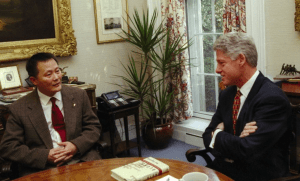Journal of Political Risk, Vol. 7, No. 6, June 2018

Pictured are Royal Navy Marines taking part in a simulated beach landing using Landing Platform Dock ships.
The Assault Ship HMS Bulwark is visable in the distance. The Marines were part of the NATO Exercise, Trident Juncture. The role of the Landing Platform Dock ships, HMS Bulwark and HMS Albion, is to deliver the punch of the Royal Marines ashore by air and by sea, with boats from the landing dock in the belly of the ship and by assault helicopter from the two-spot flight deck. LPDs can carry 256 troops, with their vehicles and combat supplies, and this can be swollen up to 405 troops. Source: Defence Imagery via Flickr.
Peter M. Solomon
Government and Regulatory Affairs Consultant
At a September 2015, joint press conference at the White House, China’s President Xi Jinping stood beside U.S. President Barack Obama and said, “China does not intend to pursue militarization” with respect to “construction activities that China are undertaking” on the Spratly Islands in the South China Sea.[1] Since then, China has established several offensive capabilities in the region, including surface-to-air and anti-ship missile systems on three features in the Spratly Islands and the ability to deploy strategic bombers from the Paracel Islands.[2] In comparison to the United States, which has been a consistent critic of China’s reclamation and militarization and has embarked on numerous freedom of maritime navigation exercises in the region, the European Union (EU) has historically been reserved in its comments regarding China’s activities in the South China Sea. Instead, the EU has limited itself to general comments about the importance of maintaining freedom of the seas and resolving disputes peacefully. While these statements are not without importance, the lack of a more critical, unified EU approach to China’s destabilizing activities has left missing a crucial voice. The tides could soon turn.




